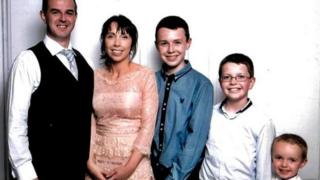Family killings help plan goes to cabinet
The Irish Justice Minister is to bring plans to cabinet for an independent research study on support for people whose relatives have been killed by a family member.
Charlie Flanagan’s plan will also look at ways to introduce reviews of domestic homicides.
In February he met the the family of Clodagh Hawe.
Clodagh and her three sons were murdered by her husband Alan Hawe at their County Cavan home in August 2016.
After the murder Clodagh’s mother and sister Mary Coll and Jacqueline Connolly thanked neighbours, friends and the local community for their support.
However, they criticised the lack of support from the government.
“We believe the state institutions and our legislation could do better in supporting survivors or the relations of the victims in such tragedies,” they said in a statement.
They told Irish national broadcaster RTÉ they want answers about the lead-up to the murders.
They want access to Garda (Irish police) files and changes in the laws and practices around such investigations in the future.
What’s being considered?
A domestic homicide review is an independent multi-agency review into the circumstances of a death – its purpose is not to apportion blame.
Currently the coroner has a very limited role in determining what happened.
A review along the lines of the model in England and Wales would allow the Garda Commissioner or Justice Minister to order a detailed look at the case.
A similar approach will require some changes to legislation.
This review process, which the Irish cabinet is expected to sign off on later, is expected to take 12 months.
In Northern Ireland the Department of Justice publicly consulted on a proposed model for the introduction of Domestic Homicide Reviews in Northern Ireland in 2018.
Kathleen Chada, whose two sons Eoghan and Ruairí Chada, were murdered by her husband in July 2013, welcomed the news but said more needed to be done for victims’ families.
Sanjeev Chada is serving a life sentence at Arbour Hill Prison in Dublin.
Ms Chada, from Ballinkillen in County Carlow, said a domestic homicide review could give families answers.
“What we would hope is that by looking at the history behind every domestic homicide that those answers will give us something to prevent other ones,” she told RTÉ’s Sean O’Rourke programme.
“For me, what it would do is give a wider answer. Because he (Sanjeev Chada) pleaded guilty there was no real court case.
“Evidence was read out and he was sentenced.
“It didn’t give me any answers around why and what led to him taking this action.
“A domestic homicide review would give an insight in what might have gone on within the community.
“What is it that was in his mind and head when he went off on that Sunday afternoon?”
Ms Chada also said more needed to be done to help victims.
“A lot of families are left to look for support themselves. I had incredible community support but I know that is not replicated around the country,” she added.
‘Hurricane goes through your world’
She said families need help with day-to-day issues.
“In the aftermath – I had to cancel the children’s allowance. The thought of that – changing my electricity, cancelling a subscription that was in Sanj’s name.
“I still had a mortgage and bills to pay as does every family caught up in something like this.”
Ms Chada said she understood how in the aftermath of the Hawe murders, Alan Hawe was buried alongside Clodagh and her boys.
Her family later had his body exhumed.
“Had Sanj killed himself with the boys that’s what I would have done. That’s what you do. You’ve got moments to make decisions,” she said.
“I know I would have regretted it as Jacqueline and Mary did – but it is like a hurricane has just gone through your entire world.
“You have to make decisions that you wouldn’t think you would ever have to make,” she added.
‘There will be women and children killed’
Ms Chada also said that while she welcomed the announcement, she believed it should be a cross-party initiative.
“My worry is that in having a study, while it is important it will take time to be completed and recommendations implemented.
“Statically and historically we know there will be women and children killed while that study’s going on. We need immediate action.”
Talking about the prospect that her husband could be released she said she was “fearful”.
“My greatest nightmare at the moment is bumping into him over the grave,” she said.
“That will be his last connection to them so will he feel an entitlement to come back and visit their grave?
“He knows the area well and will have a good idea as to where they are buried.
“There is also a fear for my life,” she added.
Source: Read Full Article



